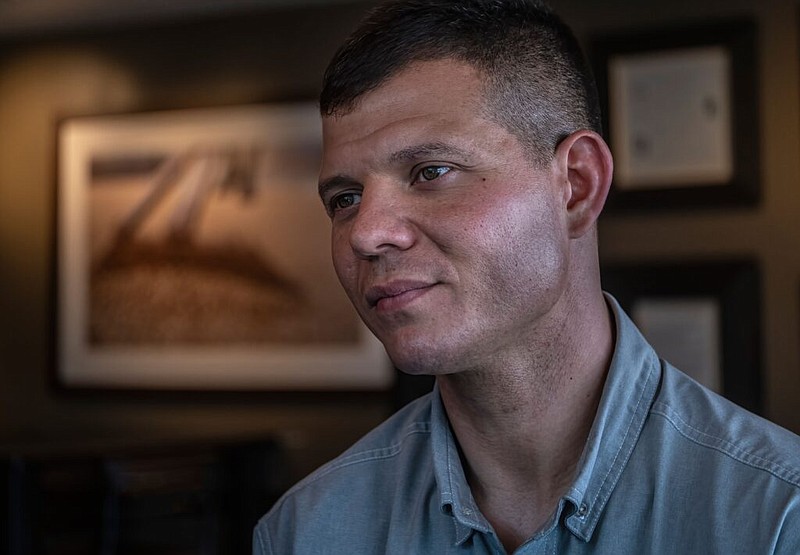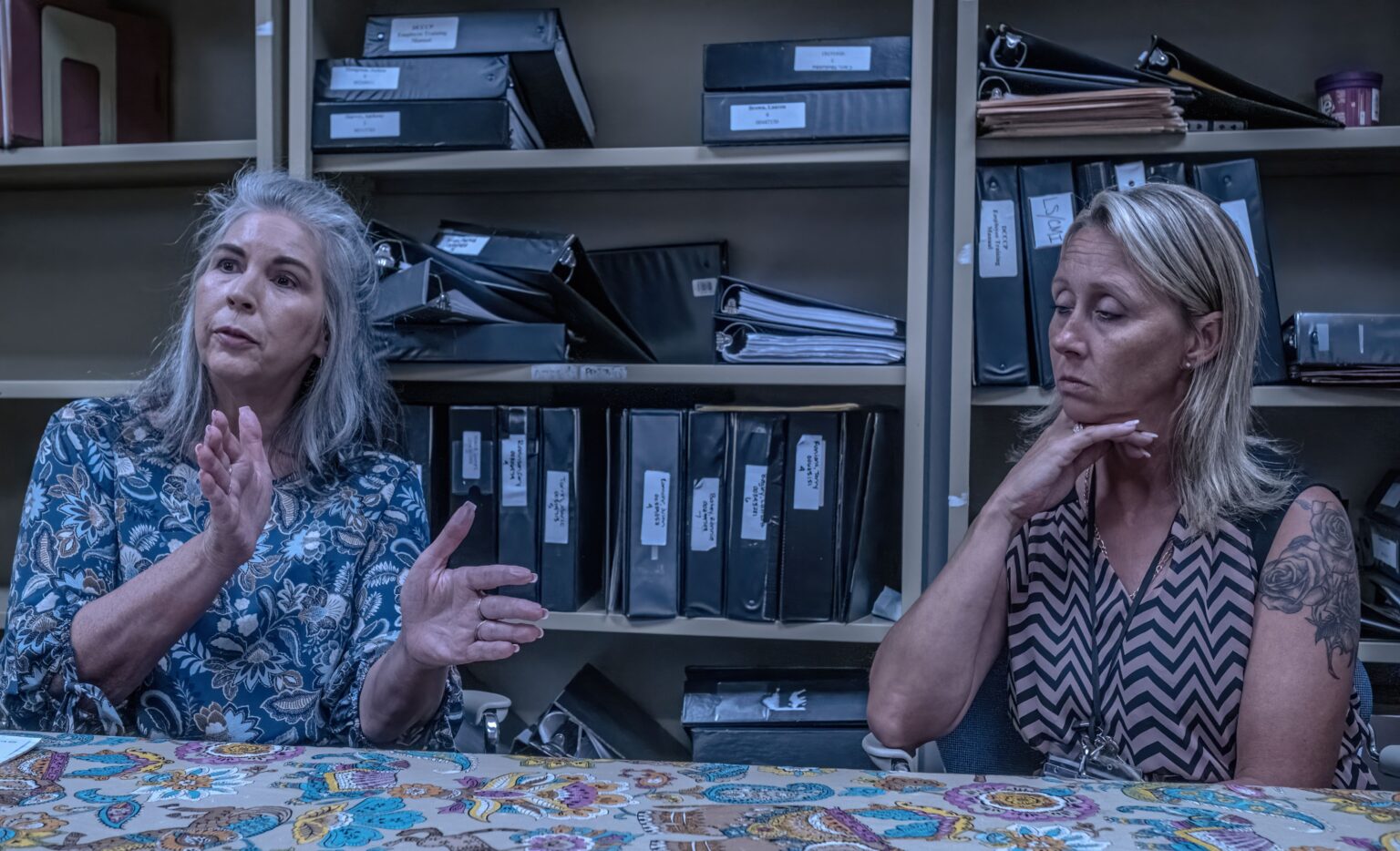Without Davidson County Community Corrections, Brandon "Lane" Gomez figures he'd be in prison or dead.
The 37-year-old Nashville man was strung out on heroin and fentanyl for about a decade, arrested on charges of felony theft to feed his habit 43 times and convicted 28 times when – fortunately, he says – a judge gave him the break he needed.
Instead of sending him to prison, the judge ordered him first to drug and alcohol treatment, then to check in with Davidson County Community Corrections. The decision saved his life.
Once he got the fogginess out of his brain, he realized he was facing years of hard time if he messed up again. One day the lightbulb came on, and he decided to give the program a chance to work rather than try to game the system.
"If you want a second chance in life, Community Corrections will help you accomplish that," Gomez said.
He still has 10 years left on probation but has too much going for him to slip up.
"It's designed for people who want to change. If you go in there with the attitude of 'I'm just going to skate by,' it's a program that'll catch you. They are very thorough. It's designed ... to weed out the people who are gonna make it and who aren't," he adds.
Community Corrections is on the brink of vanishing, though, after the Tennessee Department of Correction issued a request for grant proposals that virtually eliminates the program.
Under the program the legislature adopted in 1985, Community Corrections groups across Tennessee work with felons who either don't qualify for probation because their sentences were too long or they flunked probation and likely were headed to prison. Judges sentence convicts to Community Corrections as a last-gasp effort to keep them functioning in society.
Gomez's officer was Dawn Harper, who still works with Community Corrections, which handles everyone from sex offenders to murderers to drug users and dealers.
"She was an angel in my life. She was not only a good probation officer, she really cared," he said. "Besides just wanting me to change my life, she actually cared about what was going on in my life. So that helped a lot."
With weekly reporting, drug tests, constant counseling and a newfound faith, Gomez turned his life in a new direction. Married at a young age, he had a child when he was 17, but after a few years, he got divorced and his life deteriorated.
After being on the brink of prison, with the help of the legal system, he decided to give the Community Corrections program a legitimate chance.
"It made me have more responsibility, more accountability in my life," he said.
Gomez never felt animosity toward his probation officer or the idea she wanted to have him locked up. For once, he followed the rules, going to Alcoholics Anonymous meetings, passing a weekly drug test, taking a job, turning in his hours, doing community service and other stipulations placed on him.
"I just did 'em. I was kind of tired of living my life in and out of jail, losing everything I had, so I said 'I'm at least gonna try. What do I have to lose except going back to jail?'" he said.
After a year, he transitioned to state probation about three years ago and says he's turned his life in the right direction. He's remarried, has a relationship with his family and owns Faith Works Home Services, doing electrical and home renovations.
Gomez is disappointed to hear the program could be near its end.
Lawmakers rejected a move by Gov. Bill Lee in 2021 to eliminate the 37-year-old Community Corrections program as he passed a criminal justice reform package. After the legislature staved off that change, the Lee administration asked Community Corrections agencies to start providing more detailed data on their programs.
But with a new request for grant proposals sent out in January, the Lee administration changed the services sought for Community Corrections so drastically that it could kill the program, which serves about 7,000 people statewide, lawmakers and directors say.
In fact, some groups such as Madison County Community Corrections and Knox County Community Corrections opted not to bid on a new contract to provide intensive supervision. East Tennessee Human Resource Agency also lost services for 18 counties.
Concerned that Lee's administration made a flanking move around the legislature, Sen. Todd Gardenhire, R-Chattanooga, is planning to hold hearings to determine what happened.
The program is budgeted at $13.8 million, but in spite of the contract changes, the state wasn't projecting a savings as old contracts ran out.
Lee said recently that hearings by the legislature's Fiscal Review Committee would be "appropriate."
"We want to make sure the process is right and accurate and a good use of taxpayer dollars and serving the populations that we're trying to serve in the Department of Corrections efficiently. I think that's what's going to happen on that," Lee said.
Asked about complaints by the legislature that the governor's administration made an "end run" around lawmakers, Lee said his administration will work with the General Assembly on the matter.
FEELING THE HEAT
Larissa Burdette, program manager, and Michelle Baker, assistant program manager, for Davidson County Community Corrections have a pretty good idea what will happen without the program: More people will wind up in prison.
They've lost 13 staff members and are down to 17 since the state started making changes in the program this year. Yet the work is so ingrained in their DNA that they want to keep serving clients.
"I live every day hoping I don't have a stroke or a heart attack over it all," Burdette said in an interview at their Justice A.A. Birch Building office in downtown Nashville.
She's been working in the program since 1997 and considers this the "worst time" the office has ever had.
When they were awarded a contract, they were told they wouldn't be able to supervise people who aren't on either residential or daily reporting programs.
"That's the day we both about died. I can't even tell you the tears that flowed," Baker says.
They started contacting judges, telling them they weren't going to be able to supervise offenders anymore and tried to contact the Department of Correction to find out what was going on but couldn't get a straight answer other than "some judges are using Community Corrections when they shouldn't," she said.
Judges sentence offenders to Community Corrections, instead of state probation, to provide stricter supervision and more requirements.
"Some people need that structure. Whether they could be on probation or not, we tend to get them because, obviously, in the past, probation hasn't worked for them," Baker says.
Day reporting centers are to have intensive outpatient counseling with substance use intervention, job skills development, education, community service and therapy.
Only two locations will be available in each region of the state. And they don't replace Community Corrections as a supervision tool, the two supervisors say.
For an 18-year-old caught with heroin for the first time, Community Corrections could be the only option other than prison, a "scary" situation, Baker said.
Once the offender comes to Community Corrections, it becomes part of a family. The agency prides itself in learning not only about an offender's life, but also about their families.
"They're not a name and number to us. They are an individual that we are trying to help succeed. And, no, not everyone succeeds, and that's OK, too, because they'll learn and eventually one day will succeed," Baker says.
But those who shift to state probation and talk to an officer only once every six months won't have the support system to stay off drugs or avoid a return to crime.
"Taking an alternative sentencing measure out of the equation is only going to fill the prisons and jails. They're short-staffed, we're short-staffed. Everybody's short-staffed, but that's not going to fix the problem," Baker adds.
Since the pandemic hit, for instance, Gomez says he's seen a state probation officer only one time, reporting mainly by phone every few months. If he'd been sentenced to state probation initially, he said he likely would have failed and gone back out on the streets or to prison.
"They're there to help. It's very strict. It's not like state probation, which I'm on now. They have a lot of rules, guidelines, steps that you have to take, really to help rehabilitate or re-entry situations," Gomez says.
Without the accountability and "routine of doing right" through Community Corrections, Gomez believes he would have gone the wrong way. State probation officers don't check up on offenders, he said, and he doubts they even care.
"I was headed for prison or death, the life I was living with drugs and alcohol. If it wasn't for Community Corrections, I wouldn't have a relationship with my family, my son," he said.
Gomez believes he wouldn't have remarried or started a business either.
"None of that would have happened if I didn't have the caring and kindness I received," he said. "It sounds crazy, caring and kindness in a strict probation. But that's what I received, and it just helped transform my mind to think and act differently."

